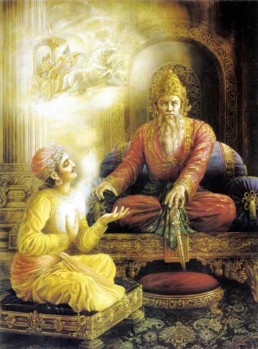Swami Chinmayananda Commentary
Continuing the argument in the previous verse, Partha declares the consequences that will follow when the true moral integrity of the families is destroyed. Slowly the morality in the society will wane and there will be an “admixture of castes.”
Caste is a word, which, in its perverted meaning, has recently come in for a lot of criticism from the educated; and they, no doubt, are all justified, if caste, in reality, meant what we understand it to be in our society today. But what we witness around us, in the name of caste, is the ugly decadence into which the Hindu way-of-living has fallen. Caste, in those days, was conceived of as an intelligent division of the available manpower in the community on the basis of intellectual and mental capacities of the individuals.
Those who were intellectuals and had a passion for research and study were styled Brahmanas (Brahmins); those who had political ambitions for leadership and took upon themselves the risky art of maintaining peace and plenty and saving the country from internal and external aggressions, were called the Kshatriyas; those who served the community though agriculture and trade were the Vaishyas and, lastly, all those who did not fall in any of the above categories were styled as Shudras, whose duties in society were service and labour. Our modern social workers and officials, agricultural and industrial labourers all must fall under this noble category!
In the largest scope of its implication, when we thus understand the caste-system, it is the same as today’s professional groups. Therefore, when they talk so seriously about the inadvisability of “admixture of the castes,” they only mean what we already know to be true in our own social pattern: an engineer in charge of a hospital and working in the operation-theatre as a doctor would be a social danger, as much as a doctor would be if he is appointed as an officer for planning, guiding and executing a hydro-electric scheme!
When the general morality of society has decayed; the young men and women, blinded by uncontrolled passion, start mingling without restraint. And lust knows no logic and cares least for better evolution or better culture. There will be thereafter, unhealthy intermingling of incompatible cultural traits.
Adi Sankara Commentary
Sri Sankaracharya did not comment on this sloka. The commentary starts from 2.10.
The Bhagavad Gita with the commentary of Sri Sankaracharya – Translated by Alladi Mahadeva Sastry
Holy Geeta – Commentary by Swami Chinmayananda
The Bhagavad Gita by Eknath Easwaran – Best selling translation of the Bhagavad Gita
The Bhagavad Gita – Translation and Commentary by Swami Sivananda
Bhagavad Gita – Translation and Commentary by Bhaktivedanta Swami Prabupadha
Srimad Bhagavad Gita Chapter 1 – Verse 41 – 1.41 adharmabhibhavat krishna – All Bhagavad Gita (Geeta) Verses in Sanskrit, English, Transliteration, Word Meaning, Translation, Audio, Shankara Bhashya, Adi Sankaracharya Commentary and Links to Videos by Swami Chinmayananda and others – 1-41

